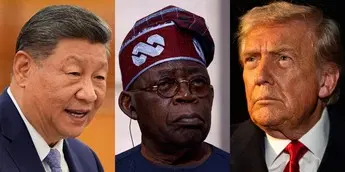China has rejected the United States’ threat to take military action against Nigeria, saying it opposes any external interference in the country’s internal affairs.
This follows U.S. President Donald Trump’s recent warning to Nigeria over alleged genocide against Christians. The Chinese government described such interference as unacceptable, urging respect for Nigeria’s sovereignty.
Chinese Foreign Ministry spokesperson, Mao Ning, said China, as a strategic partner of Nigeria, “firmly supports the Nigerian government in leading its people on a development path that fits Nigeria’s national realities,” adding that “China opposes any country’s interference under the pretext of religion or human rights.”
Trump had earlier warned that the U.S. could suspend aid or take military action if Nigeria “continues to condone the killing of Christians.”
U.S. Lawmakers Condemn Trump’s Remarks
Two U.S. lawmakers, Gregory Meeks and Sara Jacobs, described Trump’s threat as “irresponsible and reckless.” They argued that the situation in Nigeria is complex, involving clashes over land and resources rather than religion alone.
They warned that cutting aid or threatening war would harm humanitarian programs and worsen insecurity, saying Trump’s comments “risk embroiling the United States in another needless war.”
Federal Government Dismisses Genocide Claims
Minister of Information, Mohammed Idris, dismissed allegations of genocide, saying religious extremists are spreading false narratives to divide the country.
After meeting with President Bola Tinubu, Idris said Nigeria guarantees freedom of religion and remains committed to unity. “President Tinubu will continue to engage international partners to ensure understanding of Nigeria’s efforts,” he said.
Senate Plans National Response
Senate President Godswill Akpabio said the Red Chamber will engage the executive arm of government on Trump’s remarks, describing it as a matter of foreign policy.
He noted that the U.S. position is based on outdated reports, stressing that insecurity affects both Christians and Muslims. “When you attack a Muslim or Christian community, innocent citizens die regardless of faith,” he said.
U.S. Protects Its Own Interests — Dambazau
Former Chief of Army Staff, Lt. Gen. Abdulrahman Dambazau (retd.), said the U.S. threat serves no Nigerian interest. He claimed America seeks to establish a new military base in Nigeria, adding that Washington only protects its own agenda.
He also dismissed genocide claims as propaganda fueled by U.S. politicians and local clergymen, urging unity and reform in Nigeria’s security structure.
ECOWAS Rejects Genocide Allegation
The Economic Community of West African States (ECOWAS) also refuted claims of Christian genocide, warning that such narratives could fuel insecurity and weaken regional cohesion.
The bloc urged the United Nations and global partners to support member states in combating terrorism, stressing that “terrorist violence does not discriminate by religion or ethnicity.”
Northern CAN Calls for Unity
The Christian Association of Nigeria (CAN) in the 19 northern states urged Christians and Muslims to view Trump’s comments as a call for unity, not division.
Chairman Rev. John Hayab said Nigerians should use the moment to demand stronger action against insecurity, urging citizens to “reject those twisting Trump’s words to cause division.”
Southern, Middle Belt Leaders Reject U.S. Intervention
The Southern and Middle Belt Leaders Forum (SMBLF) also condemned Trump’s military threat, calling it unsolicited. The group urged the Federal Government to disarm militias and restore peace, while addressing insecurity across all regions.
Nigeria Needs Partnership, Not Invasion — NCPC
The Nigerian Christian Pilgrim Commission (NCPC) said Nigeria requires international cooperation, not threats. Executive Secretary Bishop Stephen Adegbite stated that the crisis affects both Muslims and Christians, urging global partners to provide intelligence support and counter-terrorism assistance instead.
Ex-Envoy Faults Trump’s Threat
Former Deputy Ambassador to the U.S., Ambassador Hassan Mohammed, said Trump’s threat violates international norms. He noted that the U.S. law on religious freedom allows diplomatic pressure, not military intervention.
“The International Freedom of Religion Act gives room for engagement, not war,” he said.

